PROXY MONITOR
REPORT
Winter 2013
Political Spending, Say on Pay, and Other Key Issues to Watch in the 2013 Proxy Season
By James R. Copland
In recent years, a subset of shareholder activists has sought to advance social or political causes by proposing shareholder resolutions on proxy ballots presented at corporate annual meetings. To study this phenomenon, the Manhattan Institute in 2011 launched its Proxy Monitor project, centered on the ProxyMonitor.org online database, the first publicly available, searchable resource that catalogs shareholder proposals submitted to large corporations (now updated to include the 250 largest U.S. publicly traded companies by revenue, as ranked by Fortune magazine). The ProxyMonitor.org database also includes shareholder-advisory votes on executive compensation, now required at least triennially for all publicly traded companies under the Dodd-Frank Wall Street Reform and Consumer Protection Act of 2010.[1]
This, the 16th in a series of reports and findings published under the auspices of the Manhattan Institute’s Proxy Monitor project, previews the 2013 proxy season—the period between mid-April and late June when most public companies hold annual meetings.
Part I of this report looks at the 2012 shareholder-proposal record, including submission trends, proposal subject matter, proposal sponsors, and proposals receiving majority support. This analysis contains shareholder-proposal data for all 250 companies in the ProxyMonitor.org database as well as a broader assessment of shareholder-proposal submissions that did not make proxy ballots, as determined through a company survey. A special-focus section examines shareholder proposals seeking further corporate disclosure of political spending, as well as recent regulatory efforts and litigation designed to achieve that end.
Part II surveys executive-compensation advisory vote results for 2012 and discusses a wave of 2012 shareholder litigation based on companies’ executive-compensation advisory vote disclosures. A special-focus section examines the executive-compensation record of the largest proxy-advisory firm, Institutional Shareholder Services (ISS), by tracking its 2011 recommendations against subsequent share-price movement.
Part III looks forward to the 2013 proxy season, with a recap of early shareholder-voting results for companies holding annual meetings in the first six weeks of 2013.
I. 2012 Shareholder-Proposal Record
Incidence of Shareholder Proposals
In 2012, the Fortune 250 public companies listed 303 shareholder proposals on their proxy ballots—1.21 per company, up slightly from 294 proposals (1.18 per company) in 2011. The number of shareholder proposals per company for the Fortune 250 is notably below the 1.43 in 2012 and 1.34 in 2011 for the Fortune 200, as documented in the fall 2012 Proxy Monitor report[2]—reflecting the shareholder-proposal activists’ focus on the largest public companies. While 47 percent of the Fortune 250 public companies had no shareholder proposals on their proxy ballots, 20 percent had three or more—again showing the skewed distribution of shareholder-proposal activism.
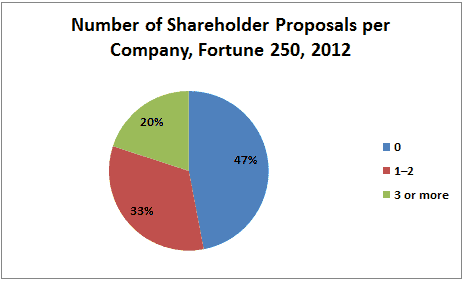
Shareholder proposals actually listed on corporate ballots present only a partial picture of shareholder-proposal activity. Many shareholder proposals never make it onto a proxy ballot because the company receiving the proposal negotiates with proposal sponsors or because it excludes the ballot item after receiving a “no action” letter from the Securities and Exchange Commission (SEC) permitting it to do so.[3] To assess the broader scope of shareholder-proposal activity, the Manhattan Institute commissioned a survey of corporate secretaries, conducted by the Society of Corporate Secretaries and Governance Professionals,[4] of the society’s member companies in the ProxyMonitor.org database.[5]
Companies responding to the survey, on average, received 2.15 shareholder proposals—77 percent more than actually appeared on proxy ballots in the ProxyMonitor.org database. Only 11 percent of companies surveyed received no shareholder proposals in 2012, while 49 percent received three or more (see chart below). Though such results may be explained at least in part by survey-response bias—only 35 companies responded to the survey, and such companies may have been larger or otherwise skewed toward companies receiving shareholder proposals—the survey results suggest significant shareholder-proposal activity beyond what is actually on proxy ballots.
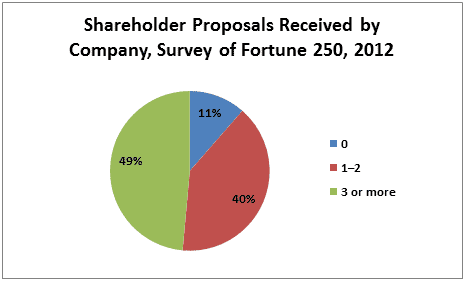
Types of Shareholder Proposals
In 2012, 43 percent of shareholder proposals listed on Fortune 250 companies’ proxy ballots involved corporate governance issues (such as the annual election of directors, shareholder-voting rules, separation of the chairman and CEO positions, or the shareholders’ ability to take action outside annual meetings by written consent or through calling special meetings). Some 16 percent involved executive-compensation issues, and 41 percent involved social or political concerns unrelated to executive compensation or corporate governance.
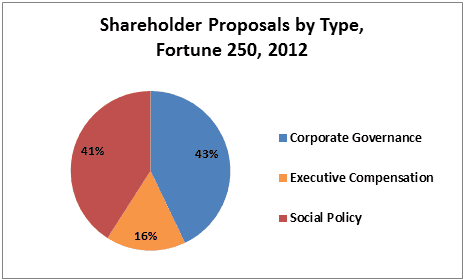
Corporate proxy ballots may understate the level of shareholder-proposal activity related to social or political issues: the Fortune 250 companies surveyed by the Society of Corporate Secretaries reported that such proposals constituted a plurality of shareholder proposals received (44 percent). Proposals related to executive compensation constituted 21 percent of all proposals received by surveyed companies. While these discrepancies may be due to bias in survey response, they may also reflect that the sponsors of proposals related to executive compensation and social or political issues are more willing to negotiate with management to remove shareholder proposals from the ballot, or that such sponsors’ proposals are more likely to contain technical defects, leading the SEC to permit the proposals to be excluded.
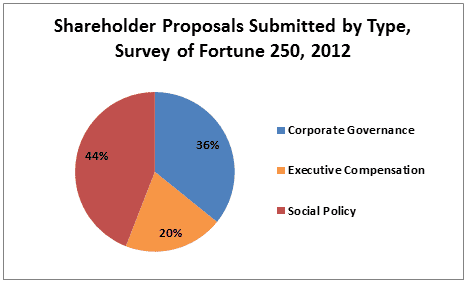
Sponsorship of Shareholder Proposals
Consistent with prior years chronicled in other Proxy Monitor reports,[6] only 1 percent of all 2012 shareholder proposals on Fortune 250 companies’ ballots were sponsored by institutional investors without a social-investing or public policy purpose, or an affiliation with a religious or labor organization. Some 36 percent of all shareholder proposals were sponsored by labor-union pension funds or other labor-affiliated investment vehicles. And 40 percent of proposals were sponsored by individuals, but over 72 percent of those were sponsored by three “corporate gadfly” investors[7] (Kenneth Steiner, John Chevedden, and Evelyn Davis),[8] along with their family members and family trusts. Excluding these three gadflies and three other, less frequently filing gadfly-type investors (James McRitchie and Gerald Armstrong, as well as social investor John Harrington), only 7 percent of shareholder proposals were sponsored by individual investors.
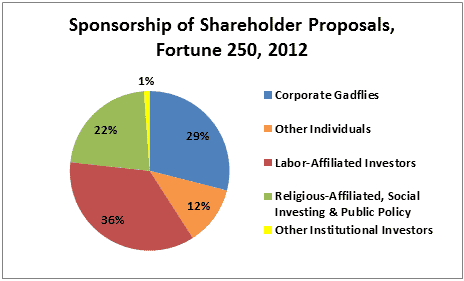
Although social-investing funds and public policy or religious groups sponsored only 22 percent of all shareholder proposals on proxy ballots in 2012—a decrease from historical trends, as previously reported[9]—this may understate their actual level of shareholder-proposal activity: Fortune 250 companies surveyed by the Society of Corporate Secretaries reported that 38 percent of all shareholder proposals they received were sponsored by religious-affiliated, social-investing, or public policy investors. Again, such disproportionate reported sponsorship may be due to bias in survey-response rate but may also reflect that such groups are more likely to drop proposals if management is willing to negotiate with them over their social or political concerns, or that this class of shareholder sponsor is more likely to submit proposals that the SEC finds technical defective.
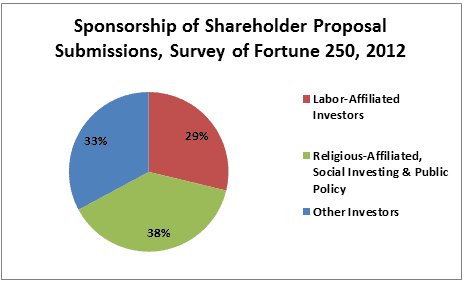
Support for Shareholder Proposals
All told, 26 of the 303 shareholder proposals on Fortune 250 companies’ proxy ballots received the support of a majority of shareholders in 2012.[10] Each of these involved corporate governance issues. The proposals most likely to receive majority shareholder support were those seeking to “declassify” director elections (i.e., to elect all directors annually, rather than hold “staggered” board elections, which preserve board continuity but serve as anti-takeover devices that may, according to some empirical studies,[11] reduce share value). Nine such proposals received majority support, as well as eight proposals seeking to require directors to receive the support of a majority, rather than plurality, of voting shareholders for election. Other proposals receiving majority support included those seeking to permit shareholders to act outside annual meetings by written consent or by calling special meetings; those seeking to separate the positions of chairman and chief executive officer; and one seeking to grant shareholders “proxy access,” i.e., to place their own nominations for director on the corporate proxy ballot, subject to certain restrictions.[12]
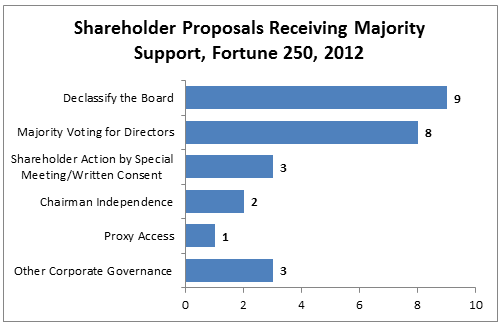
|
Special Focus: Political Spending
In 2012, the Fortune 250 public companies faced 57 proxy ballot items relating to corporations’ political spending or lobbying—18.8 percent of all such proposals, more than any other single class of proposal—in keeping with activist trends since the Supreme Court issued its controversial 2010 decision in Citizens United v. Federal Election Commission,[13] which held that corporations’ independent political expenditures are protected free speech under the First Amendment. Also in keeping with recent trends, such proposals failed to attract widespread support, winning on average the support of 18.3 percent of shareholders, down from 24.3 percent in 2011. Although certain large institutional investors supported many political-spending-related proposals (notably, AllianceBernstein, MFS, Morgan Stanley, and Wells Fargo), the seven largest such investors—Vanguard, BlackRock, State Street, Fidelity, Capital World Investors, Capital Research Global Investors, and T. Rowe Price—supported only 3.6 percent of all proposals calling for increased disclosure of corporate political spending.
Perhaps owing to the dearth of broad shareholder support for proposals seeking to increase the disclosure of corporate political spending, certain academics and activists have now submitted a rulemaking petition with the Securities and Exchange Commission seeking SEC requirements on publicly traded companies’ political-spending disclosures.[14] Such a proposal would seem far afield from the SEC’s stated purposes—protecting investors, ensuring market efficiency, and facilitating capital formation[15]—and it would seem peculiar indeed for the commission to mandate disclosures rejected by a majority of shareholders at every company to consider the issue.[16] That said, the SEC has branched off in directions outside its market-facilitating scope in recent years,[17] and activists have launched an impressive Astroturf campaign generating hundreds of thousands of supportive comments filed with the agency[18] so it is not clear how the SEC is likely to react.
In addition to seeking regulatory remedies to advance their political-spending-disclosure agenda, certain shareholder activists have turned to litigation. On January 2, 2013, the New York State Common Retirement Fund, overseen by the state’s comptroller, Democrat Thomas P. DiNapoli, filed suit against the company Qualcomm in Delaware Chancery Court, demanding to investigate the company’s internal political-spending records.[19] (To assist in the claim, DiNapoli hired the plaintiffs’ securities class action firm Bernstein Litowitz Berger & Grossmann, which has contributed $47,500 to DiNapoli’s campaign coffers since he became state comptroller in 2007, on top of $130,550 the firm gave to other Democratic Party candidates and committees over the last 15 years.)[20] Section 220 of Delaware’s General Corporation Law permits shareholders to inspect companies’ “books and records” for “any proper purpose,” so long as such inspection would not breach contractual agreements with outside parties.[21] The contractual exception would presumably limit companies from disclosing political arrangements governed by nondisclosure clauses, but whether the Delaware courts will more generally deem DiNapoli’s inquiry about political spending to be a “proper purpose” under Delaware law—a provision usually invoked to investigate claims of corporate mismanagement or seek information germane to stock valuation—is unclear.[22]
On Friday, February 22, Qualcomm and DiNapoli announced that they had settled the case, with Qualcomm agreeing to certain disclosures[23], so the legal theory pressed by DiNapoli may not be tested for some time.
|
II. Executive-Compensation Advisory Voting
Beginning in 2011, under the Dodd-Frank Act, publicly traded companies had to submit their executive-compensation plans to shareholders for an advisory vote. The shareholders of most companies have opted to hold such advisory votes annually.[24]
Executive-Compensation Advisory Votes: 2012 Results
In 2012, 231 of the Fortune 250 public companies had shareholder advisory votes on executive compensation. A majority of shareholders voted against managements’ board-approved executive-compensation packages at just five of these companies: Best Buy (38.2 percent support), Chesapeake Energy (19.9), Citigroup (45.1), Community Health Systems (32.9), and Oracle (40.9). At another 17 companies, a majority of shareholders supported executive-compensation packages, but at least 30 percent of shareholders voted against—a significant total, given that the dominant proxy-advisory firm, ISS, takes the position that it will challenge management to respond whenever 30 percent or more of shareholders voted against management’s proposed executive-compensation plan, even if a majority of shareholders approved. (In 2011, a majority of shareholders voted against executive-compensation packages at five of 248 Fortune 250 public companies holding executive-compensation advisory votes, and at least 30 percent of shareholders voted against pay packages at 24 of these companies.)
Shareholder Litigation over Executive-Compensation Advisory Vote Disclosure
Section 951 of the Dodd-Frank Act, which mandated shareholder-advisory votes on executive compensation for publicly traded companies, specifically provided that such votes “shall not be binding on the issuer or the board of directors of an issuer, and may not be construed … to create or imply any change to the fiduciary duties of such issuer or board of directors … [or] to create or imply any additional fiduciary duties for such issuer or board of directors.”[25] Such language would appear to preclude shareholder litigation over boards’ failure to heed such a nonbinding vote; nevertheless, after say-on-pay rules went into effect, “the plaintiff’s bar began filing stockholder derivative lawsuits alleging breach of fiduciary duty after any negative say-on-pay vote.”[26]
After these suits were overwhelmingly dismissed,[27] plaintiffs’ lawyers embarked on a new strategy: “suing companies before the say-on-pay vote to enjoin the vote based on alleged misleading disclosures” in the proxy statements regarding executive-compensation packages.[28] In 2012, the New York plaintiffs’ firm Faruqi & Faruqi filed such suits against 33 companies, including Microsoft, Clorox, and H&R Block.[29] Because of the threat of derailing a corporation’s annual meeting, at exorbitant expense, such lawsuits have in terrorem settlement value.
Indeed, on April 10, 2012, Superior Court Judge James Kleinberg in Santa Clara, California, enjoined Brocade’s annual meeting—scheduled two days later—based on a Faruqi suit. The next day, the company disclosed further details on its stock-incentive plan—and paid the Faruqi firm $625,000 in attorneys’ fees.[30] Eleven courts granted motions to dismiss Faruqi claims, but according to a report by the Pillsbury Winthrop Shaw Pittman law firm, at least five more companies settled on the eve of a judicial hearing seeking such an injunction.[31] “The settlements include supplemental disclosures and/or undertakings with respect to the company’s corporate governance practices, and a payment of attorneys’ fees and costs to plaintiffs’ counsel for up to several hundred thousand dollars.”[32]
|
Special Focus: ISS and Executive Compensation
As shown in the Manhattan Institute’s fall 2012 Proxy Monitor report,[33] the recommendations of the largest proxy-advisory firm, Institutional Shareholder Services (ISS), tend to be associated with lower shareholder support for executive-compensation packages: econometric analysis shows that an “against” recommendation by ISS correlates to a 17.5-percentage-point decline in shareholder votes for executive-compensation packages. While some of this association is doubtless attributable to common factors weighed by both institutional shareholders and ISS, some may be due to certain institutional investors—particularly, smaller funds with limited capacity to conduct their own analyses—effectively outsourcing their proxy-voting decisions to their proxy adviser.
To examine shareholders’ and ISS’s assessment of executive compensation, the Manhattan Institute conducted an analysis of annual shareholder returns at companies in the year following 2011 shareholder-advisory votes on executive compensation, using data for 190 of the Fortune 200 public companies, for which the Institute has ISS “for” or “against” vote recommendations. Such analysis is predicated upon the premise that a shareholder interested in maximizing shareholder return is unconcerned with executive pay per se but may oppose executive-pay packages that divert shareholders’ resources to management without returning value to shareholders by attracting or retaining key personnel or generating incentives consistent with risk-adjusted shareholder return.[34]
Overall, in 2011, ISS proved significantly more likely to oppose executive-compensation plans than did a majority of company shareholders: ISS recommended that shareholders vote against executive pay at 25 of the 190 companies studied (13.2 percent), whereas a majority of shareholders opposed executive-compensation packages at only three of these companies (1.6 percent): Constellation Energy (38.6 percent support), Freeport McMoRan (45.5), and Hewlett-Packard (48.2).[35]
ISS’s recommendations do not generally hold up well in instances when the proxy-advisory firm’s determination varies from the broader class of shareholders. Among companies receiving 50 to 70 percent shareholder support for executive pay,[36] those companies with an ISS “against” recommendation in 2011 performed significantly better than those receiving an ISS “for” recommendation: the ISS-against companies saw share prices fall by an average of only 5.8 percent in the following year, while the ISS-for companies saw share prices fall 13.1 percent. Similarly, among companies getting more than 70 percent shareholder support for executive pay, companies with an ISS-against recommendation did relatively better than those receiving an ISS- for recommendation: the ISS-against companies’ share prices by an average of only 1.8 percent, versus 2.3 percent for the ISS-for companies.
Thus, in general, when shareholders departed from ISS’s viewpoint, shareholders tended to get it right and ISS tended to get it wrong, looking at share-price performance ex post.[37] Given this fact—and the empirical evidence that a significant percentage of institutional investors follow ISS’s recommendations in virtual lockstep[38] to fulfill their government-mandated fiduciary obligations to cast informed votes[39]—ISS’s influence over executive-compensation advisory voting remains troubling. ISS did decide for the 2013 proxy season to modify its peer-group methodology in evaluating executive pay,[40] so further research on the question is necessary to evaluate the quality of ISS’s recommendations going forward.
Also worth watching is any movement by the proxy adviser to support efforts seeking to link executive compensation to social or environmental indicators, beyond mere share-price maximization. While ISS’s stated metrics for assessing executive compensation do not include such links, for 2013, ISS reversed its prior position of generally voting against shareholder proposals seeking “to link, or report on linking, executive compensation to environmental and social criteria such as corporate downsizings, customer or employee satisfaction, community involvement, human rights, environmental performance, or predatory lending.”[41] The proxy adviser now will consider such proposals on a case-by-case basis. Given that linking executive compensation to “environmental and social criteria” is almost certainly destructive of shareholder value, ISS’s decision is further evidence of the influence that labor-affiliated and social-investing funds hold over the proxy adviser. Investors and policy analysts should be on the lookout for shareholder proposals seeking to link executive compensation to social and political issues in 2013, as well as watching ISS to see if it actually starts supporting such proposals in significant numbers—or if its announced policy shift is merely a change in form, over substance.
|
III. 2013 Proxy Season: Early Returns and Outlook
Early Returns
While most publicly traded companies hold their annual meetings between April and June, nine of the Fortune 250 public companies had held 2013 meetings with relevant shareholder votes by February 15: Air Products and Chemicals (APD), Costco (COST), Emerson Electric (EMR), Jabil Circuit (JBL), Jacobs Engineering (JEC), Johnson Controls (JCI), Monsanto (MON), Visa (V), and Walgreen (WAG). Four more companies—AmerisourceBergen, Apple, Deere, and Navistar—are scheduled to meet in late February. At each of the companies to have met by February 15, more than 90 percent of shareholders approved executive-compensation plans.
The nine companies holding meetings by February 15 faced only nine shareholder proposals. Notably, three of these nine proposals sought to “declassify” the board of directors and elect all director elections annually, introduced at Air Products and Chemicals, Costco, and Jacobs Engineering. Each of these board-declassification proposals was introduced by the Pension Reserves Investment Trust Fund of Massachusetts, a public-employee pension fund,[42] and each received at least 70 percent of the vote. Two of the three proposals disclosed in the proxy statement that the fund had been advised by the Shareholder Rights Project, a clinical program at Harvard Law School directed by law professor Lucian Bebchuk.[43] (The project discloses that in 2013, it is working with eight institutional investors on submitting shareholder proposals, seven of which are affiliated with organized labor, as well as the Nathan Cummings Foundation.)[44]
In addition to these board-declassification proposals, two more corporate-governance-related proposals were on proxy statements in early 2013: one seeking to empower shareholders to act by written consent; and the other to separate the positions of chairman and CEO. Each of these was introduced at Johnson Controls, and neither received the support of 30 percent of shareholders.
Walgreen was the only company meeting by mid-February to face a shareholder proposal that was related to executive compensation: a stock-option vesting proposal introduced by the labor-affiliated Amalgamated Bank. The proposal received just over 41 percent shareholder support.
Three companies faced shareholder proposals relating to social or political issues in early 2013. Visa faced a proposal seeking disclosure of corporate spending related to politics or lobbying, introduced by the social-investing fund Boston Common Asset Management.[45] The proposal received support from just over 30 percent of voting shareholders. In addition, Monsanto faced a proposal related to genetically modified foods and Emerson Electric a proposal calling on the company to issue a “report on sustainability,” which received 7 and 30 percent shareholder support, respectively.
What to Watch For
Board Declassification. The early success of shareholder proposals calling for board declassification makes these proposals ones to watch for 2013, particularly with the Bebchuk group’s intensified focus on the topic. Such proposals should be expected to continue to generate significant shareholder support, given the empirical evidence that annually electing all directors increases the viability of takeover threats,[46] adding to share value.
Proxy Access. The 250 largest U.S. public companies faced only three shareholder proposals seeking “proxy access” for shareholders wishing to nominate directors to the board in 2012—the first year in which shareholders were permitted by the SEC to introduce such proposals, after the mandatory proxy-access rule previously instituted by the SEC was struck down as “arbitrary and capricious” by the U.S. Court of Appeals for the D.C. Circuit in July 2011.[47] (Almost 60 percent of shareholders supported the proposal at Chesapeake Energy, whose underperforming management was under pressure by activist investor Carl Icahn, while a large majority of shareholders rejected such proposals at Medtronic and Wells Fargo.) The year 2013, however, may see more activity on the proxy-access front. Walt Disney, scheduled to meet on March 6, faces a shareholder proposal,[48] filed by Legal & General Investment Management on behalf of the British social-investing firm Hermes Equity Ownership Services, seeking to allow groups of shareholders who have held at least 3 percent of the company’s stock for three years to nominate directors to the board, with nominees placed on corporate proxy statements. Interestingly, a similar proxy-access proposal was introduced by the management of Hewlett-Packard, which will be holding its annual meeting March 20.[49]
Chairman Independence. Proposals seeking to separate chairman and CEO roles were the second-most-introduced class of shareholder proposals in 2012. Two of these, at McKesson Corporation and Sempra Energy, received majority backing from shareholders. The prominence of such proposals in 2012 followed an announced “campaign” on the topic by labor-pension-fund leaders[50]—and labor funds have sponsored a majority of these proposals historically.[51] (Since these proposals effectively call for chairmen-CEOs to give active company management or effectively submit to a superior on the board of directors, they are “highly sensitive for corporate leaders, [and] labor’s role in backing this class of proposals raises the prospect that unions are attempting to leverage the shareholder-proposal process to gain negotiating position over management.”[52] In 2013, as previously discussed, Johnson Controls, meeting on January 23, faced a chairman-independence proxy ballot item that received under 30 percent shareholder support. Walt Disney, meeting March 6, and Whole Foods, meeting March 15, also face such proposals. The American Federation of State, County, and Municipal Employees (AFSCME) has announced that it is filing such a proposal with JPMorgan Chase.[53]
Political Spending. Although only one of the Fortune 250 public companies has faced a shareholder proposal related to political spending thus far in 2013, the issue remains one to watch in the coming year. Starbucks, holding its annual meeting on March 20, has already mailed its proxy statement, including a shareholder proposal seeking to prohibit political spending on the part of the company, introduced by the social-investing fund Harrington Investments.
ENDNOTES
- Pub. L. No. 111-203, 124 Stat. 1376 (2010)[hereinafter Dodd-Frank Act].
- James R. Copland, Proxy Monitor 2012: A Report on Corporate Governance and Shareholder Activism, 6 (Manhattan Inst. for Pol’y Res., Fall 2012).
- No-Action Letters, SEC, http://www.sec.gov/answers/noaction.htm (last visited Feb. 27, 2013).
- Society of Corporate Secretaries and Governance Professionals, http://www.ascs.org (last visited Feb. 27, 2013).
- Of the companies surveyed, 35 responded.
- Copland, Proxy Monitor 2011: A Report on Corporate Governance and Shareholder Activism, 7 (Manhattan Inst. for Pol’y Res., Fall 2011). Note: As with other reports and findings in the Proxy Monitor series, the percentage breakdown of shareholder- proposal sponsorship excludes the proposals at companies that do not make available the identity of proposal sponsors.
- Copland, supra note 2, at 7-8.
- Id.
- Id. at 8.
- In assessing shareholder vote totals, the Manhattan Institute counts shareholder support consistent with a company’s practice. Some companies measure shareholder support by dividing the number of votes “for” by the total number of shares voting “for” and “against,” and other companies measure shareholder support by dividing the number of favorable votes by the number of shares present and entitled to vote—effectively counting abstentions as “against” votes. Because such voting rules are in companies’ publicly available bylaws and thus known to shareholders, the Manhattan Institute takes the position that voting support is best measured according to the rules that each company actually uses to assess such support.
- See Lucian A. Bebchuk, Alma Cohen & Charles C.Y. Wang, Staggered Boards and the Wealth of Shareholders: Evidence from Two Natural Experiments (Nat'l Bureau of Econ. Research, Working Paper No. 17127, June 2011), available at http://www.nber.org/papers/w17127.
- Copland, supra note 2, at 18.
- 558 U.S. 310 (2010).
- Letter from Committee on Disclosure of Corporate Political Spending, Petition for Rulemaking (Aug. 3, 2011), available at http://www.sec.gov/rules/petitions/2011/petn4-637.pdf.
- The Investor's Advocate: How the SEC Protects Investors, Maintains Market Integrity, and Facilitates Capital Formation, SEC, http://www.sec.gov/about/whatwedo.shtml (last visited Feb. 27, 2013).
- Only one such proposals, centering on companies’ political spending or lobbying, introduced at a Fortune 200 company from 2006 through 2012 has received the support of a majority of shareholders. This was a 2006 proposal asking Amgen to prepare a report on its political contributions policy, which was supported by 67 percent of shareholders after the company’s board of directors endorsed the proposal.
- See SEC Guidance Regarding Disclosure Related to Climate Change, 17 C.F.R. §§ 211, 231 and 241 (2010), available at http://www.sec.gov/rules/interp/2010/33-9106.pdf.
- Comments on Rulemaking Petition: Petition to require public companies to disclose to shareholders the use of corporate resources for political activities, File No. 4-637, SEC, http://www.sec.gov/comments/4-637/4-637.shtml (last visited Fed. 27, 2013); Paul Blumenthal, Corporate Political Spending Pushes SEC To Consider Disclosure Rule, Huffington Post, Jan. 18, 2013, http://www.huffingtonpost.com/2013/01/08/corporate-political-spending_n_2432618.html.
- See Verified Complaint for Inspection of Books and Records, NYS Retirement Fund v. Qualcomm Inc., C.A. No. 8170 (Del. Ch., Jan. 2, 2013), available at, http://www.blbglaw.com/cases/Qualcomm_data/qualcomm_complaint.pdf; see also Nicholas Confessore, State Comptroller Sues Qualcomm for Data About Its Political Contributions,N.Y. Times, Jan. 3, 2013, at A18.
- See FollowTheMoney, Bernstein, Litowitz, Berger & Grossmann, http://www.followthemoney.org/database/topcontributor.phtml?u=10353&y=All&incy=0&ince=0&incs=0&incf=0 (last visited Feb. 27, 2013).
- Del. Code Ann. tit. 8, § 220 (West 2010).
- See, e.g., Shareholder Inspection Demands Surge: Be Ready, Perkins Coie (Feb. 05, 2007), http://www.perkinscoie.com/shareholder-inspection-demands-surge-be-ready-02-05-2007; Francis Pileggi, Commentary on Recent Delaware Decisions interpreting DGCL Section 220: Rights of Shareholders to Books and Records, Delaware Corporate & Commercial Litigation Blog (Apr. 17, 2011),http://www.delawarelitigation.com/2011/04/articles/selected-articles-by-francis/commentary-on-recent-delaware-decisions-interpreting-dgcl-section-220-rights-of-shareholders-to-books-and-records.
- Dan Strumpf, Qualcomm Settles Disclosure Suit With New York, Wall St. J. (Feb. 22, 2013), available at http://online.wsj.com/article/SB10001424127887323549204578320500077425818.html.
- Copland, supra note 6, at 13.
- 15 U.S.C. § 78n-1(c)).
- Kevin LaCroix, "Say on Pay" and Executive Compensation Litigation: Plaintiffs' New Racket, The D&O Diary (Oct. 31, 2012), http://www.dandodiary.com/2012/10/articles/executive-compensation/say-on-pay-and-executive-compensation-litigation-plaintiffs-new-racket/.
- See Gordon v. Goodyear, 2012 WL 2885695, *10 (N.D. Ill. July 13, 2012) (collecting cases); see also Swanson v. Weil, 2012 WL 4442795 (D. Colo. Sept. 26, 2012); see also Haberland v. Bulkeley, No. 5:11-CV-463-D (E.D.N.C. Sept. 26, 2012).
- LaCroix, supra note 26.
- David F. Larcker and Brian Tayan, Shareholder Lawsuits: Where Is the Line Between Legitimate and Frivolous?, Stanford Closer Look Series (Nov. 27, 2012), available at www.gsb.stanford.edu/sites/default/files/documents/29_Lawsuits.pdf.
- Nate Raymond, Analysis: Lawyers gain from 'say-on-pay' suits targeting U.S. firms, Thomson Reuters News & Insight (Nov. 30, 2012), http://newsandinsight.thomsonreuters.com/Legal/News/2012/11_-_November/Analysis__Lawyers_gain_from__say-on-pay__suits_targeting_U_S__firms.
- Sarah A. Good, Cindy V. Schlaefer, & Ana N. Damonte, Plaintiffs’ Firms Gaining Steam in New Wave of Say-On-Pay Shareholder Suits?, Pillsbury Law (Nov. 19, 2012), available at http://www.pillsburylaw.com/siteFiles/Publications/AlertNovember2012LitigationPlaintiffsFirmsGainingSteaminNewWaveofSayOnPayShareholderSuits.pdf. See, e.g., Boxer v. Accuray Inc., No. C 12-5722 (N.D. Cal., Nov. 28, 2012), available at http://law.justia.com/cases/federal/district-courts/california/candce/4:2012cv05722/260577/26.
- Id.
- Copland, supra note 2, at App. A.
- Some shareholders interested solely in maximizing share return might also vote against an executive compensation package as a signal of dissatisfaction with management, business plans, or prospects, without actually taking issue with the pay package itself.
- ISS opposed the executive compensation packages at each of the three companies receiving less than majority support from shareholders. In the three instances in which a majority of shareholders agreed with ISS’s recommendation to vote against executive compensation, companies’ shares generally performed poorly in the subsequent year, falling 17.1 percent, versus only a 2.1 percent decline across the total sample of companies.
- Share prices at companies receiving 50 to 70 percent shareholder support for executive compensation packages fell 8.1 percent in the subsequent year, versus only a 2.1 percent decline across the total sample of companies, which generally mitigates in favor of ISS’s stated position holding such companies to greater scrutiny, notwithstanding “the risk of empowering minority investors who may take issue with executive pay in the proxy process for reasons unrelated to share value.” Copland, Shareholder Activism: What to Watch for in the 2012 Proxy Season, (Manhattan Inst. for Pol’y Res., Winter 2012).
- Such a finding is perhaps unsurprising, given the efficient-markets hypothesis. As noted in the Fall 2012 Proxy Monitor report, “Although it is possible that ISS is better informed about shareholders’ interests … than shareholders themselves and that shareholders are simply getting such questions wrong, such a hypothesis presumes that thousands of sophisticated institutional investors making large bets in their own interest are systematically erring relative to a single, small company with a limited budget and 600 employees.” Copland, supra note 2, at 23.
- Id. at 23-24.
- Copland, Politicized Proxy Advisers vs. Individual Investors, Wall St. J. (Oct. 7, 2012), http://online.wsj.com/article/SB10000872396390444620104578012252125632908.html?mod=WSJ_Opinion_LEFTTopOpinion.
- See Institutional S'holder Servs., U.S. Corporate Governance Policy: 2013 Updates (Nov. 16, 2012), available at http://www.issgovernance.com/files/2013USPolicyUpdates.pdf.
- Id.
- Pension Reserves Investment Management Board, http://www.mapension.com/ (last visited Feb. 27, 2013).
- Shareholder Rights Project, http://srp.law.harvard.edu/ (last visited Feb. 27, 2013).
- Clients, Shareholder Rights Project, http://srp.law.harvard.edu/clients.shtml (last visited Feb. 27, 2013).
- Boston Common Asset Management, LLC, http://www.bostoncommonasset.com/ (last visited Feb. 27, 2013).
- See Bebchuk, supra note 11.
- Business Roundtable & Chamber of Commerce of the U.S. v. SEC, 647 F.3d 1144, 1148 (D.C. Cir. 2011), available at http://www.cadc.uscourts.gov/internet/opinions.nsf/89BE4D084BA5EBDA852578D5004FBBBE/$file/10-1305-1320103.pdf.
- See The Walt Disney Company, Proxy Statement (Schedule 14A) (Jan. 18, 2013), available at http://www.sec.gov/Archives/edgar/data/1001039/000120677413000240/waltdisney_def14a.htm.
- See Hewlett-Packard Co., Proxy Statement (Schedule 14A) (Feb. 1, 2013), available at http://www.sec.gov/Archives/edgar/data/47217/000104746913000585/a2212649zdef14a.htm#Pros4.
- Copland, supra note 36, at 1.
- See Copland, supra note 6, at 19.
- Id.
- See Dan Fitzpatrick, Investors Seek to Split JP Morgan Top Posts, Wall St. J., Feb. 21, 2013, at C3.